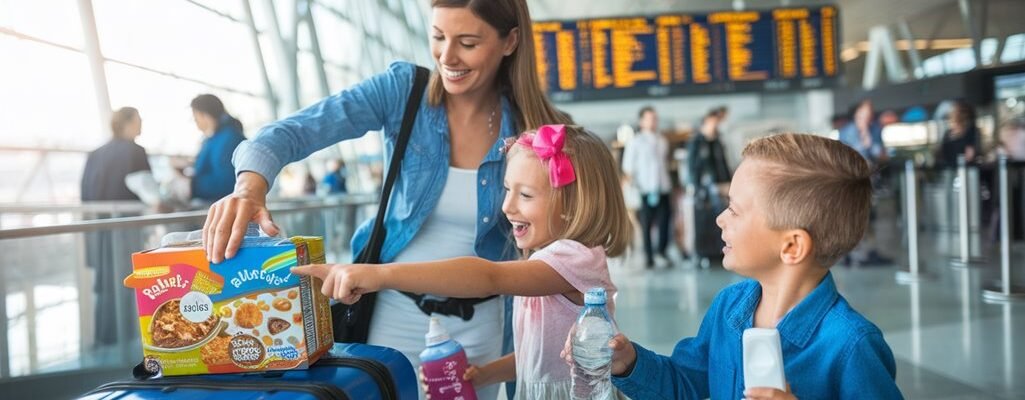
Tips for Managing Food Allergies While Traveling With Kids
When traveling with kids who have food allergies, start by researching destinations known for allergy-friendly dining. Communicate your child's specific allergies to restaurants ahead of time and clearly upon arrival. Pack a selection of safe snacks to reduce the need for local options. Always carry allergy medications and create an emergency action plan. Involve your kids in choosing snacks to help them feel included in the process. Stay calm and flexible; unexpected challenges can be great teaching moments. By applying these strategies, you can help ensure a safe and enjoyable trip for everyone, paving the way for more insights.
Research Destination Options
When planning a family trip, it's crucial to research destination options that cater to your child's food allergies. Effective destination research can significantly enhance your travel experience by ensuring allergy awareness is prioritized.
Start by identifying locations known for their accommodating food policies, such as family-friendly resorts or cities with a strong reputation for allergen-free dining.
Utilize online resources and forums to gather insights from other families who've navigated similar challenges. Look for destinations with local restaurants that clearly label their menus, and those that have a track record of handling food allergies safely.
Don't hesitate to check if the area has grocery stores or markets that offer allergen-free products. This can provide peace of mind and flexibility during your trip.
Consider reaching out to local allergy support groups or organizations to gain deeper insights into the area's food scene. Their recommendations can be invaluable.
Communicate With Restaurants
Effective communication with restaurants is essential for ensuring your child's safety while dining out during your trip. Begin by researching restaurants that prioritize allergy awareness. Many establishments have staff trained in food allergies and can make necessary menu modifications.
Before you arrive, call ahead to discuss your child's specific allergies. This proactive approach allows the staff to prepare for your visit and ensures they understand the seriousness of the situation.
When you arrive, clearly state your child's allergies to the server. Don't hesitate to ask questions about ingredients and preparation methods to avoid cross-contamination. It's beneficial to have your child's allergies written down, as this can help avoid misunderstandings.
If the menu doesn't offer safe options, politely ask for alternatives or modifications. Many chefs are willing to accommodate requests, especially when they know a child's safety is at stake.
Lastly, trust your instincts. If you feel uneasy about a restaurant's ability to handle allergies, it's okay to walk away. Prioritizing your child's safety means advocating for their needs, allowing you all to enjoy your travels with confidence and peace of mind.
Pack Safe Snacks
Packing safe snacks is a crucial step in managing food allergies while traveling with kids. When you hit the road, you want to ensure that your little ones have tasty, allergy-friendly options on hand.
Start by exploring snack alternatives that cater to their dietary restrictions. Think about packing homemade granola bars, fruit leather, or popcorn. These options aren't only delicious but also easy to make and customize.
When it comes to packing techniques, consider using airtight containers or resealable bags to keep snacks fresh and organized. Label each container clearly, so your kids know what's safe to eat.
If you're traveling by air, remember to check TSA guidelines on bringing food items. It's also wise to pack extra snacks in case of delays or unexpected situations.
Don't forget to involve your kids in the process! Let them choose their favorite safe snacks, making the journey more enjoyable.
Use Allergy-Friendly Apps
Finding safe snacks is just the beginning of managing food allergies while traveling with kids. To further empower your journey, consider utilizing allergy-friendly apps. These tools serve as invaluable travel resources, helping you navigate unfamiliar areas with ease and confidence.
Allergy apps can provide essential information about restaurants, grocery stores, and even food brands that cater to your child's specific allergies. They often include user-generated reviews, so you can see firsthand experiences from other families who've successfully dined out.
Additionally, many apps allow you to filter options based on dietary restrictions, saving you time and reducing stress when you're on the go.
Some apps also offer features like ingredient scanning. You can simply take a picture of a food label, and the app will alert you to any allergens present. This means you can shop or dine out without second-guessing every item.
Educate Your Kids
As you prepare for your travels, it's crucial to educate your kids about their food allergies. Start by discussing what allergies are and how they can affect their bodies. Use kid-friendly resources like interactive websites or storybooks that explain allergies in a relatable way. This helps them understand the importance of avoiding certain foods and empowers them to make safe choices.
Encourage your children to communicate their allergies clearly. Teach them how to read food labels and recognize potential allergens. Role-playing scenarios, like ordering food at a restaurant, can make this learning process engaging and practical.
Make sure they know to ask questions about ingredients when dining out, fostering confidence in their ability to advocate for their health. Utilizing allergy education tools can further enhance their knowledge. Consider apps that provide information about allergy-friendly options or connect with others who've similar experiences.
The more informed your kids are, the more freedom they'll feel while traveling. This proactive approach not only keeps them safe but also allows them to enjoy new experiences without fear. Remember, knowledge is power, especially when it comes to managing food allergies on the go.
Prepare for Emergencies
Having a solid emergency plan in place can make all the difference when traveling with kids who've food allergies. First, create an allergy action plan that outlines specific steps to take in case of an allergic reaction. This plan should include details about the allergens your child must avoid, symptoms to watch for, and instructions for administering emergency medication, like an epinephrine auto-injector.
Next, compile a list of emergency contacts, including local medical facilities and your child's healthcare provider. Keep this information handy in both physical and digital formats, so you can access it quickly when needed. Share this plan with your family members, caregivers, and anyone else who'll be responsible for your child during your trip.
Additionally, carry a medical alert card that lists your child's allergies and any necessary medications. This can be especially useful if your child becomes unresponsive or unable to communicate.
Label Foods Clearly
Clear labeling of foods is crucial when traveling with kids who've food allergies. When you're on the go, it's easy to overlook what's in the snacks you pack. Always check food packaging for allergy labels, as these provide essential information about potential allergens.
Familiarize yourself with common allergens—like nuts, dairy, and gluten—so you can quickly identify safe options.
If you're bringing homemade snacks, label them clearly. Use waterproof stickers or food-safe markers to identify ingredients and highlight any allergens. This not only helps you but also informs anyone else who might be handling the food.
When dining out, don't hesitate to ask staff about their allergy protocols and request that they confirm your food is free from allergens. Many restaurants are becoming more aware of food allergies and are willing to accommodate your needs if you communicate clearly.
Choose Accommodations Wisely
Choosing the right accommodations can significantly impact your family's safety when traveling with kids who've food allergies. Start by researching accommodation types that prioritize allergy awareness.
Hotels, for instance, may offer allergy-friendly rooms or specific allergy policies that cater to guests with dietary restrictions. Look for places that provide detailed information about their food handling practices and the availability of allergen-free meals.
Consider vacation rentals, too. They often come equipped with kitchens, allowing you to prepare safe meals for your kids. This option gives you control over the ingredients and helps avoid cross-contamination.
When you book, reach out to the host or management to discuss your child's allergies and ensure they can accommodate your needs.
Read reviews from other allergy-conscious families to gain insights into their experiences. Some establishments may even share success stories or tips on how they handle food allergies.
Stay Calm and Flexible
Even with careful planning and the right accommodations, unexpected situations can arise when traveling with kids who've food allergies.
It's essential to maintain a travel mindset that embraces flexibility. Kids are unpredictable, and so are travel plans. If a restaurant can't accommodate your child's dietary needs or a snack option isn't available, don't panic. Instead, lean on your family support system. Discuss alternative food options together, whether it's finding a grocery store or preparing something in your accommodation.
Staying calm in these moments helps set a positive tone for your kids. They'll pick up on your emotions, so if you remain relaxed, they're more likely to feel secure.
Remember, your plans might change, but the goal of enjoying your trip remains the same.
Being adaptable can turn a potential crisis into an opportunity for creativity. Pack snacks that cater to your child's allergies, and always have backup plans ready.
The journey is just as important as the destination, and by keeping a flexible attitude, you'll not only manage food allergies effectively but also create lasting memories with your family.
Frequently Asked Questions
How Do I Find Local Allergy Support Groups While Traveling?
To find local allergy support groups while traveling, use allergy apps to locate nearby resources. Check online forums and social media for recommendations, or contact local hospitals for information on support networks and community events.
What Should I Do if My Child Has a Reaction Abroad?
If your child has a reaction abroad, follow emergency procedures immediately. Seek local medical facilities for prompt care, carry necessary medications, and ensure you communicate the allergy clearly to medical staff for effective treatment.
Can I Trust Food Labels in Foreign Countries?
You can't always trust food labeling in foreign countries due to cultural differences. Ingredients and allergens may vary significantly, so it's best to ask locals or restaurant staff for clarification to ensure your safety.
Are There Travel Insurance Options for Food Allergies?
Yes, you can find travel insurance options that include allergy coverage. Research policies that specifically mention food allergies, ensuring they provide assistance in case of allergic reactions, so you can travel confidently and freely.
How Can I Teach My Child to Ask About Allergens?
To teach your child allergen awareness, encourage them to use clear communication strategies. Role-play questions about ingredients, practice assertiveness, and reinforce their confidence in asking about allergens at restaurants or gatherings. Empower them to advocate for themselves.
Conclusion
Traveling with kids who have food allergies can be challenging, but with the right preparation, you can make it a positive experience. By researching your destination, communicating with restaurants, and packing safe snacks, you'll minimize risks. Utilize allergy-friendly apps and educate your kids about their allergies, so they feel empowered. Always be prepared for emergencies and choose accommodations that prioritize safety. Stay calm and flexible, and you'll create lasting memories while keeping your family safe.




